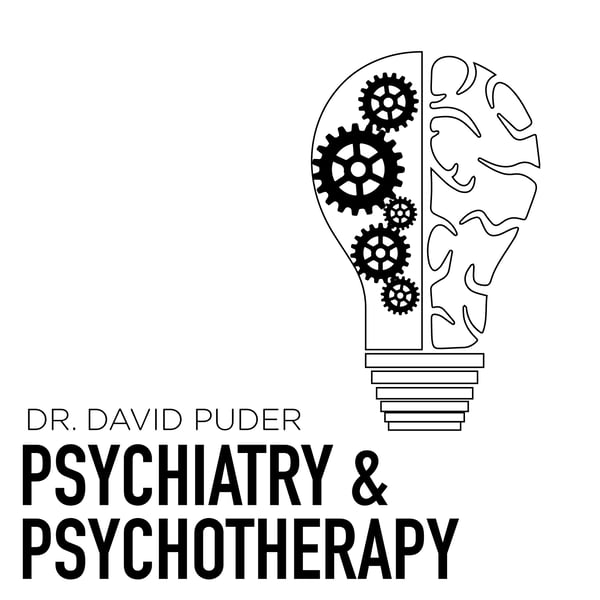Ketamine and Psychedelics with Dr. Michael Cummings
Psychiatry & Psychotherapy Podcast
David J Puder
4.8 • 1.3K Ratings
🗓️ 25 September 2018
⏱️ 38 minutes
🧾️ Download transcript
Summary
On this week’s episode of the podcast, I interview Dr. Cummings, a reputable psychopharmacologist, about ketamine. We talk about psychedelics, the research behind it, both the positives and the negatives. We will look at how it is or is not helpful in psychiatric treatments.
(Disclaimer: There are no conflicts of interest to report. Neither Dr. Puder or Cummings is affiliated with any companies in favor of ketamine and other drug companies.)
Ketamine
Although ketamine has recently become a medication of great interest in psychiatry, it actually is a fairly old medication. It was first synthesized in 1962 and began human trials for anesthesia in 1964. It was finally approved by the FDA as a dissociative anesthetic in 1970.
What has piqued interest in psychiatry is that infusion of a smaller dose of ketamine produces a rapid response in terms of reversal of depressed mood, suicidality, and some treatment-resistant depressed patients.
The literature is rich (in one sense) as the most recent consensus statement (Sanacora, 2017) looked at seven randomized controlled trials, all of which support a robust antidepressant response and anti-suicide response. The difficulty with those trials is the majority of them lasted only one week. A few of the later trials lasted two to three weeks with two to three infusions per week. So, what’s lacking at this point is adequate data regarding long term treatment response and data about transitions to more traditional antidepressant treatments.
For the rest of the blog that goes with this episode, go: here
Instagram: dr.davidpuder
Twitter: @DavidPuder
Facebook: DrDavidPuder
Transcript
Click on a timestamp to play from that location
| 0:00.0 | Welcome to the Psychiatry and Psychotherapy Podcast. The podcast to help you in your journey |
| 0:06.0 | towards becoming a wise, empathic, genuine and connected mental health professional. |
| 0:11.0 | I'm your host, Dr. David Puder, a psychiatrist who splits his time practicing psychopharmacology, |
| 0:17.0 | individual and group psychotherapy, medical director of a day treatment program, |
| 0:21.0 | medical education research, and teaching residents and medical students. |
| 0:30.0 | So welcome back to the podcast. I'm here with Dr. Michael Cummings, |
| 0:38.0 | a great resource, amazing psychopharmacologist, Dr. Cummings. Welcome to the show. |
| 0:43.0 | Thank you very much. I'm happy to be back. |
| 0:45.0 | And today we are going to be talking about ketamine and psychedelics and some of the research, |
| 0:53.0 | both the positive, what we have research-wise for these drugs, |
| 0:57.0 | for the use actually of treating psychiatric illness, and some of the limitations. |
| 1:03.0 | And I'm coming to this personally from a place of skepticism, you know, like I want to see the evidence first. |
| 1:11.0 | I know some people I know are kind of jump into it full head first and are really, really excited about it, |
| 1:18.0 | but I've been kind of watching the literature, and I'm really excited to hear where Dr. Cummings is. |
| 1:24.0 | We have no conflicts of interest that we have to report. |
| 1:29.0 | We do not get any money from drug companies. We don't belong to any pro-psychedelic or pro-ketamine task force, |
| 1:38.0 | or you know, like we don't have clinics set up to make money out of those things. |
| 1:43.0 | So I think we're hopefully going to be approaching the literature as objectively as possible. |
| 1:49.0 | So Dr. Cummings, okay. Why don't we start with ketamine? |
| 1:54.0 | Although ketamine has recently become a medication of great interest in psychiatry, |
| 2:00.0 | it actually is a fairly old medication. It was synthesized in 1962, began human trials for anesthesia in 1964, |
| 2:10.0 | and was approved by the FDA as a dissociative anesthetic in 1970. |
... |
Please login to see the full transcript.
Disclaimer: The podcast and artwork embedded on this page are from David J Puder, and are the property of its owner and not affiliated with or endorsed by Tapesearch.
Generated transcripts are the property of David J Puder and are distributed freely under the Fair Use doctrine. Transcripts generated by Tapesearch are not guaranteed to be accurate.
Copyright © Tapesearch 2025.

